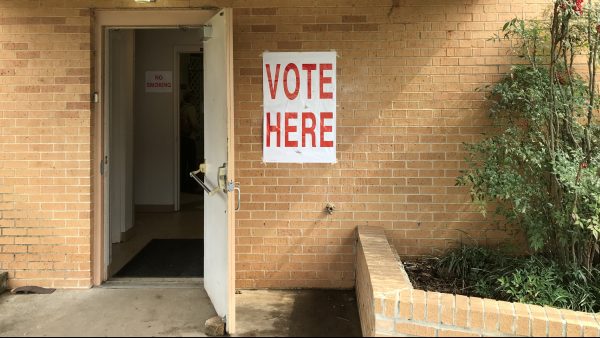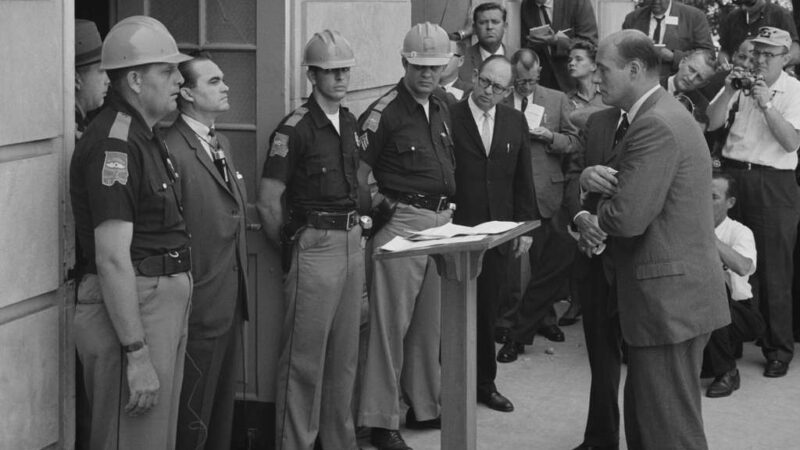Alabama Republican Senate Contest Headed To A Runoff
Republican voters in Alabama have the chance to do it all over again.
No candidate cracked 50% in yesterday’s primary for the Republican nomination for U.S. Senate. The March 31st runoff will feature former Auburn University football coach Tommy Tuberville and former U.S. Attorney General Jeff Sessions. Unofficial primary results show Tuberville with about 33% of the vote and Session at almost 32%. Mobile-area Congressman Bradley Byrne and former Alabama Supreme Court Chief Justice Roy Moore trailed with 25% and 7% respectively.
Jacksonville State University political scientist Lori Owens says name recognition played a role. Sessions had it as a former senator and U.S. attorney general. Tuberville was known because of his time leading the Auburn Tigers. It’s a different story for Byrne.
“Bradley Byrne was known is his area of the state and tried to break through and obtain more name identification statewide,” Owens says, “but it was just difficult for him to do.”
Owens says the two-man race will be very nasty and intense. Tuberville has not run for public office before, and Owens expects him to face significant scrutiny.
“I’m not sure how prepared for that scrutiny he’s going to be,” Owens says.
Sessions has a record from his time in the Senate and in the Trump Administration. He was ultimatedly forced to resign from his position attorney general. While President Trump didn’t weigh in during the primary, Wednesday morning he tweeted his displeasure with Sessions.
This is what happens to someone who loyally gets appointed Attorney General of the United States & then doesn’t have the wisdom or courage to stare down & end the phony Russia Witch Hunt. Recuses himself on FIRST DAY in office, and the Mueller Scam begins! https://t.co/2jGnRgOS6h
— Donald J. Trump (@realDonaldTrump) March 4, 2020
The winner of the runoff on March 31st will face Democratic U.S. Senator Doug Jones in November.
Meanwhile, Alabama Democrats gave a boost to former Vice President Joe Biden in his quest to win the Democratic nomination for President. He finished with about 63% of the vote, far ahead of Vermont Senator Bernie Sanders at nearly 17% and former New York Mayor Michael Bloomberg with about 12%. Bloomberg announced Wednesday morning that he’s withdrawing from the race. Massachusetts Senator Elizabeth Warren drew about 6% of the vote in Alabama and her team has said they’re assessing the path forward.
Owens was not surprised by Biden’s victory.
“He’s a name that people recognize. He’s a face that people recognize,” Owens says. “Of course, Doug Jones endorsed him.”
Bloomberg’s poor showing comes despite spending more than half-a-billion dollars in Super Tuesday states, including Alabama.
“Probably some people saw Bloomberg entering the race late [and] kind of resented that,” Owens says. “They may see it as Bloomberg trying to buy the election.”
Owens also points to a speech Bloomberg gave Sunday at a Selma church as part of the commemoration of 1965’s “Bloody Sunday,” when voting rights marchers were beaten while crossing the Edmund Pettus Bridge in Selma. A handful of people in the audience turned their backs to Bloomberg as he spoke.
“That was an indicator as to what the black vote might be,” Owens says. “He just was not seen a being a sincere candidate, I think, in many respects.”
How George Wallace and Bull Connor set the stage for Alabama’s sky-high electric rates
After his notorious stand in the schoolhouse door, Wallace needed a new target. He found it in Alabama Power.
FIFA president defends World Cup ticket prices, saying demand is hitting records
The FIFA President addressed outrage over ticket prices for the World Cup by pointing to record demand and reiterating that most of the proceeds will help support soccer around the world.
From chess to a medical mystery: Great global reads from 2025 you may have missed
We published hundreds of stories on global health and development each year. Some are ... alas ... a bit underappreciated by readers. We've asked our staff for their favorite overlooked posts of 2025.
The U.S. offers Ukraine a 15-year security guarantee for now, Zelenskyy says
Ukrainian President Volodymyr Zelenskyy said Monday the United States is offering his country security guarantees for a period of 15 years as part of a proposed peace plan.
Genre fiction and female authors top U.S. libraries’ most-borrowed lists in 2025
All of the top 10 books borrowed through the public library app Libby were written by women. And Kristin Hannah's The Women was the top checkout in many library systems around the country.
The Best Tiny Desk Concerts of 2025
Which Tiny Desk made an audio engineer question everything? Which one made a producer want to cry? Touch grass? Look back on the year in Tiny Desk, with the people who make them.








